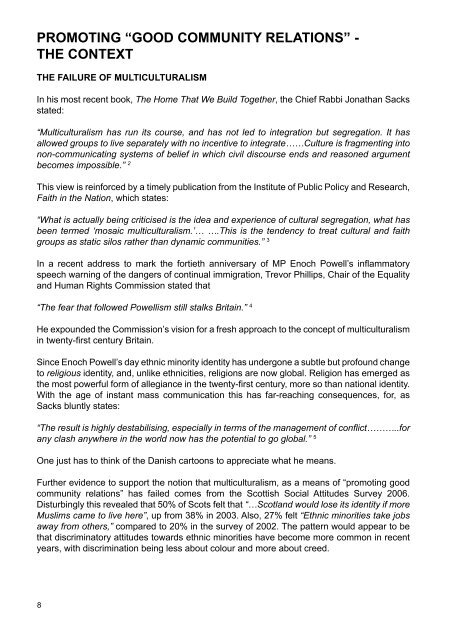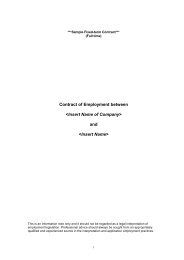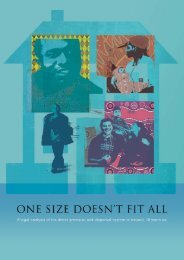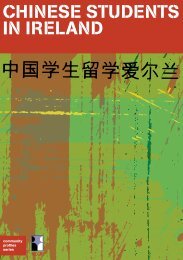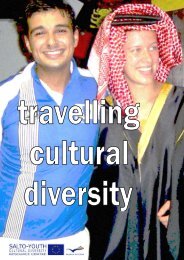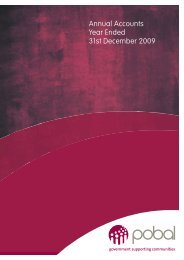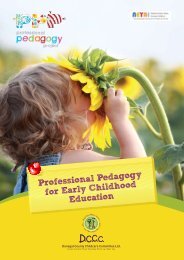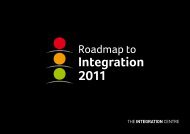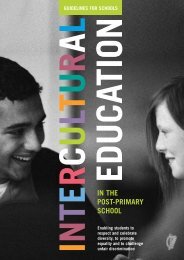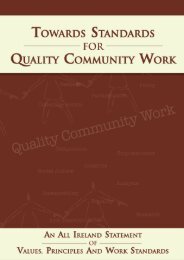PROMOTING “GOOD COMMUNITY RELATIONS” -THE CONTEXTTHE FAILURE OF MULTICULTURALISMIn his most recent book, The Home That We Build Together, the Chief Rabbi Jonathan Sacksstated:“Multiculturalism has run its course, and has not led to <strong>in</strong>tegration but segregation. It hasallowed groups to live separately with no <strong>in</strong>centive to <strong>in</strong>tegrate……Culture is fragment<strong>in</strong>g <strong>in</strong>tonon-communicat<strong>in</strong>g systems <strong>of</strong> belief <strong>in</strong> which civil discourse ends and reasoned argumentbecomes impossible.” 2This view is re<strong>in</strong>forced by a timely publication from the Institute <strong>of</strong> Public Policy and Research,Faith <strong>in</strong> the Nation, which states:“What is actually be<strong>in</strong>g criticised is the idea and experience <strong>of</strong> cultural segregation, what hasbeen termed ‘mosaic multiculturalism.’… ….This is the tendency to treat cultural and faithgroups as static silos rather than dynamic communities.” 3In a recent address to mark the fortieth anniversary <strong>of</strong> MP Enoch Powell’s <strong>in</strong>flammatoryspeech warn<strong>in</strong>g <strong>of</strong> the dangers <strong>of</strong> cont<strong>in</strong>ual immigration, Trevor Phillips, Chair <strong>of</strong> the Equalityand Human Rights Commission stated that“The fear that followed Powellism still stalks Brita<strong>in</strong>.” 4He expounded the Commission’s vision for a fresh approach to the concept <strong>of</strong> multiculturalism<strong>in</strong> twenty-first century Brita<strong>in</strong>.S<strong>in</strong>ce Enoch Powell’s day ethnic m<strong>in</strong>ority identity has undergone a subtle but pr<strong>of</strong>ound changeto religious identity, and, unlike ethnicities, religions are now global. Religion has emerged asthe most powerful form <strong>of</strong> allegiance <strong>in</strong> the twenty-first century, more so than national identity.With the age <strong>of</strong> <strong>in</strong>stant mass communication this has far-reach<strong>in</strong>g consequences, for, asSacks bluntly states:“The result is highly destabilis<strong>in</strong>g, especially <strong>in</strong> terms <strong>of</strong> the management <strong>of</strong> conflict………..forany clash anywhere <strong>in</strong> the world now has the potential to go global.” 5One just has to th<strong>in</strong>k <strong>of</strong> the Danish cartoons to appreciate what he means.Further evidence to support the notion that multiculturalism, as a means <strong>of</strong> “promot<strong>in</strong>g goodcommunity relations” has failed comes from the Scottish Social Attitudes Survey 2006.Disturb<strong>in</strong>gly this revealed that 50% <strong>of</strong> Scots felt that “…Scotland would lose its identity if moreMuslims came to live here”, up from 38% <strong>in</strong> 2003. Also, 27% felt “Ethnic m<strong>in</strong>orities take jobsaway from others,” compared to 20% <strong>in</strong> the survey <strong>of</strong> 2002. The pattern would appear to bethat discrim<strong>in</strong>atory attitudes towards ethnic m<strong>in</strong>orities have become more common <strong>in</strong> recentyears, with discrim<strong>in</strong>ation be<strong>in</strong>g less about colour and more about creed.8
TOWARDS A COMMONALITY OF VALUESThe key f<strong>in</strong>d<strong>in</strong>g from the Cantle Report on the 2001 race riots <strong>in</strong> Northern England was <strong>of</strong> townsshow<strong>in</strong>g a “depth <strong>of</strong> polarisation” around segregated communities lead<strong>in</strong>g “parallel lives.” 7Ethnic and religious differences were be<strong>in</strong>g tolerated, but the many and rich commonalities <strong>of</strong>life shared together were largely ignored. Recognition <strong>of</strong> this clear failure <strong>of</strong> multiculturalismas an approach to promot<strong>in</strong>g good community relations resulted <strong>in</strong> the production <strong>of</strong> a reportfrom the English government’s new Commission on Integration and Community, entitled OurShared Future. The Chair <strong>of</strong> the Commission, Darra S<strong>in</strong>gh, firmly stated that:“Our vision <strong>of</strong> society is one where people are committed to what we all have <strong>in</strong> commonrather than obsess<strong>in</strong>g with those th<strong>in</strong>gs that make us different.” 8The executive summary emphasises the importance <strong>of</strong> “articulat<strong>in</strong>g what b<strong>in</strong>ds communitiestogether rather than what differences divide them.” 9Aris<strong>in</strong>g from this report the government commissioned a consultation document Face-to-Faceand Side-to-Side: A Framework for Inter Faith Dialogue and Social Action. This aimed toidentify a framework that would not only strengthen <strong>in</strong>ter faith relations, but also promotemore positive relationships with wider civil society. “Face-to-Face” dialogue describes thedialogue which leads to a better understand<strong>in</strong>g between different faith groups. “Side-by-Side”dialogue, however, <strong>in</strong>volves collaborative social action not only between faith communities butalso wider civil or secular society. One approach taken was to commit to work together for the“common good,” ground<strong>in</strong>g this <strong>in</strong> identify<strong>in</strong>g the“….values and ideals we all share together: community, personal <strong>in</strong>tegrity, a sense <strong>of</strong> rightand wrong, learn<strong>in</strong>g, wisdom, and love <strong>of</strong> truth, care and compassion, justice and peace,respect for one another, and for the earth and its creatures.” 10Thus it can be seen that these <strong>in</strong>itiatives emphasised a move away from focuss<strong>in</strong>g ondifferences, to one affirm<strong>in</strong>g the commonality <strong>of</strong> various fundamental moral and ethical values.This commonality <strong>of</strong> community values has to be the bridge that all the different faith groupscan share with secular society or ‘the non-faith community’.A GLOBAL ETHICThe Scottish Government Equality Unit has formed a Religion and Belief <strong>St</strong>rategy FrameworkWork<strong>in</strong>g Group, the aim be<strong>in</strong>g to provide a framework for constructive dialogue between thecountry’s faith and belief communities. This is felt to be“….an essential part <strong>of</strong> build<strong>in</strong>g a Scotland where all people can exist co-harmoniously.” 11One <strong>of</strong> the documents <strong>in</strong>form<strong>in</strong>g the Work<strong>in</strong>g Group is A Call To Our Guid<strong>in</strong>g Institutions,presented by Pr<strong>of</strong>essor Hans Kung at the 1999 World Parliament <strong>of</strong> Religions <strong>in</strong> Cape Town.This was a formal appeal from the World Parliament to the various governments <strong>of</strong> the world toapply the Global Ethic, signed by over 200 Religious and Spiritual leaders. Quot<strong>in</strong>g Pr<strong>of</strong>essorKung on the “Global Ethic”:“What then is the basis for a Global Ethic, shared by people <strong>of</strong> all great religions and ethicaltraditions? First, the pr<strong>in</strong>ciple <strong>of</strong> humanity: every human be<strong>in</strong>g – man or woman, white orcoloured, rich or poor, young or old – must be treated humanely, more explicitly expressed <strong>in</strong>9


